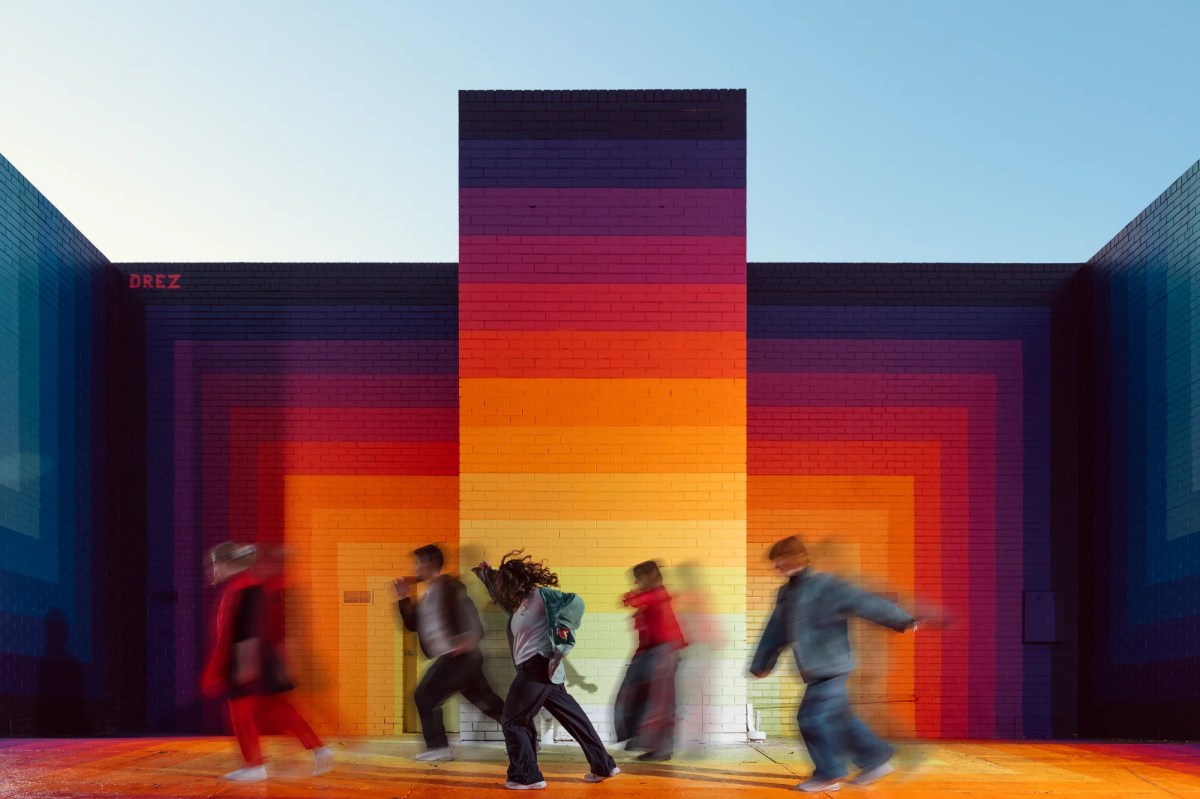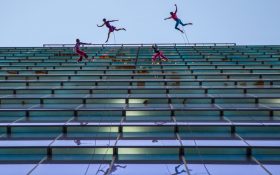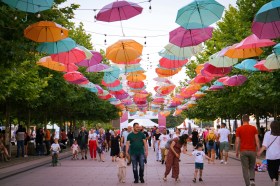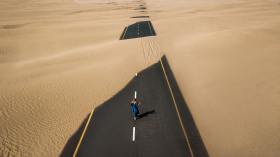Now in its 43rd year, Melbourne Fringe’s theme for 2025 is ‘Action Heroes’ – which the Festival’s Creative Director and CEO, the dapper Simon Abrahams, stresses is definitely not about donning a cape and becoming a masked vigilante.
Melbourne Fringe 2025: quick links
An audience-powered Melbourne Fringe
‘We need to imagine the world that we want to create, and we need to step up as artists, as audiences, as citizens – we need to take responsibility to shape and change the world, to create this [better] world that we can imagine,’ Abrahams tells ArtsHub.
Melbourne Fringe is facilitating this process though its 2025 Civic Commission, Power Move by Quiet Riot: a temporary public artwork in the city’s civic heart, Fed Square.
Power Move is a free, kinetic dancefloor that captures and stores energy generated by Melburnians’ collective actions. Every day of the Fringe, which runs from 30 September to 19 October 2025, the technology embedded in the participatory dancefloor will convert movement into electricity, with public data displaying how much energy is being produced.
The resulting human-powered electricity will fuel the work’s daily dance activities, including live music, DJs, cultural performances and interactive artworks.
Abrahams says Power Move is ‘a challenge to the people of Melbourne … to literally get off their bums, get moving and … create power, be the power that they want to be in order to create a more equitable, sustainable, creative world.’
Beyond its application to powering a central Fringe event, Power Move arguably could remind audiences that while we can feel overwhelmed by the omni-crises facing the world today – climate collapse, resurgent fascism, genocide – when communities take collective action they can generate true and lasting change.
Abrahams agrees, saying, ‘People do feel powerless, but I think also people don’t see that they can make change. And of course, our individual power is limited, but collectively, we can make a difference. And I think one of the points we wanted to make as well, is that, you know, protests can be joy. We wanted to kind of create artistic contexts that are joyful and celebratory and bring people together.’
‘Action heroes’ theme echoes throughout the 2025 Melbourne Fringe
Elsewhere in the Fringe program, both in the open access program of 450 events that has been the Festival’s raison d’être since 1983, as well as in the expansive curated program – this year including into the brand new Passport program of international acts, some of them co-commissioned by Melbourne Fringe, and the Pulse program of works by leading Australian independent artists.
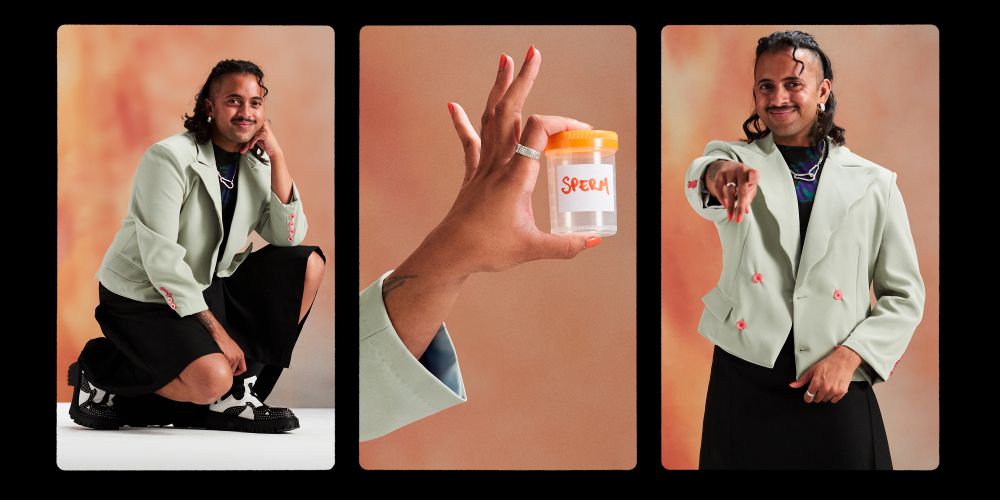
The Passport program includes First Trimester by British artist Krishna Istha, an exploration of queer approaches to family-making, the politics of reproduction, and Istha’s quest to find them and their partner a sperm donor, where audiences can observe the durational performance or participate directly; Handle With Care by Belgium’s Ontroerend Goed, a participatory work based around a box on stage, with no cast or traditional staging, the show beginning when an audience member opens the box; and Canadian company Mammalian Diving Reflex’s Nightwalks with Teenagers, which is part performance, part guided social encounter and invites reflection on public space, youth culture, and trust.
The Pulse program likewise features new works by Australian companies and artists such as THE RABBLE, Pulsing Heart, Fast Fashun and Snuff Puppets, A Daylight Connection, Polyglot Theatre, Harrison Ritchie-Jones and Rawcus.

Pulsing Heart’s Voices is an interactive sound installation combining sculpture and choral music that invites playful, collective participation in the act of music-making; Tattoo Show by Rawcus centres on a single audience volunteer interviewed live on stage by the Rawcus ensemble, with the conversation guiding the design of a tattoo they receive during the show – though they don’t see the design until it’s finished; The Rabble’s UNWOMAN (the protest) is a durational performance work involving hundreds of participants publicly sharing real accounts of fertility, birth, and bodily autonomy and which combines protest, performance, and collective testimony – and features a long braid made from donated hair.
Should Melbourne Fringe be promoting international artists?
The Passport program sounds impressive, but it also begs the question: if Melbourne Fringe’s primary purpose is to provide a platform for and shine a spotlight on local independent artists through its open access program, why is it spending money on international artists? Wouldn’t that money be better spent on reducing registration costs for the Fringe, subsiding venue hiring fees, and generally ensuring it’s less of a financial risk for local artists to put on a Fringe show?
‘I’ve been here at Melbourne Fringe for 10 years, and over that time, my focus has been [on] making Melbourne Fringe a more inclusive and accessible place,’ Abrahams replies calmly, without becoming defensive.
Read: Australian arts students unable to get US visas for study exchange
‘We’ve launched initiatives like our micro-grants program named after [the late] Ralph McLean, the Chair of Fringe: that has been about bringing in micro-grants to support registration costs or venue costs – and we have worked really hard to make Fringe the most inclusive and accessible festival. So I absolutely agree with that as our mandate and what we’re here to do.
‘But I also think there’s a there’s been a real shift in the [cultural] landscape, and we … want to ensure that Melbourne Fringe is not just a place that celebrates the local artistic scene – we are absolutely that – but also we want to push the local artists. We want to create a bit of inspiration and aspiration to increase international conversation, and ultimately, also increase export of local artists. And the way you do that is by reciprocal arrangements, “We’ll present some of your artists if you present some of ours,” and finding really bold art that will help local artists to take risks as well,’ he explains.
Abrahams adds that Melbourne Fringe’s Passport program has been supported by philanthropic donors and funders, as well as some government funding. ‘None of the organisation’s core funding has supported Passport,’ he stresses.
The open access program: the ‘beating heart’ of Melbourne Fringe
At the Festival’s core is the open program, which Abrahams calls ‘the beating heart of Melbourne Fringe. It has been for 43 years, and it will be forever.’ Common themes emerging from the open program this year include a strong focus on the experience, especially trans identity; works exploring fertility and family-making, the climate crisis, and – a new theme this year – works addressing and exploring Artificial Intelligence (AI).
In total this year, Fringe’s open program features 450 events across every simple genre, including – in keeping with the Fringe as a playground for experimentation – several established artists taking creative risks.
Comedian Sammy J has written his first ever musical, ‘called Fiasco, which is a Burke and Wills musical. Sammy talks about Melbourne Fringe being the only place where he could do that, where he could take the risk in such a supportive environment,’ Abrahams enthuses.
‘Tom Ballard has a new play… It’s not a stand up show, it’s a play that he’s written. Vidya Makan and Sonya Suares have also a new musical, The Lucky Country … So there’s, you know, really established artists who are trying new things and kind of pushing boundaries,’ he continues.
‘I try not to pick favourites, but I’m excited by artists like Lilikoi Kaos, of course – incredible circus artist – [she] has also moved into a new form with a work called Too Much, which is a cabaret storytelling work. Last year’s winners of Best Theatre, the a2 Company [from Aoteraoa/New Zealand], are here with a new work called Motion Sickness, which is kind of a multi-artform piece … There’s a huge amount of clowning this year – I think there’s something about the rebirth of the clown that has that has hit Melbourne this year… It really is an enormous festival that feels full of bold ideas and ambitious art-making,’ Abrahams says.
Read: Undercover Artist Festival: meet the stars and crew who bring it to life
And alongside the open program artists Abrahams has named are hundreds more, some of them preparing for their artistic debuts. Abrahams demurs when this writer describes this year’s Melbourne Fringe debutantes as the artists whose praises we’ll be singing in the future.
‘They’re absolutely the future of performance in Melbourne, but they’re also the present. They’re the artists making incredible work right here, right now, and premiering at this year’s Fringe. So the only way to find out [who they are] is to come along – buy a ticket,’ he quickly responds.
The 2025 Melbourne Fringe Festival runs from 30 September to 19 October, Visit the Fringe’s website for details.
Discover more arts, games and screen reviews on ArtsHub and ScreenHub.
This article was amended after publication, at 6:08pm on Saturday 12 August, in order to remove a quote from Abrahams saying Tom Ballard’s new play is his first play; Ballard previously staged a theatrical work called ‘#KWANDA: A Play‘ at the 2019 Melbourne International Comedy Festival. It was edited again on 5 September to correct the spelling of Vidya Makan and Sonya Suares’ names.
